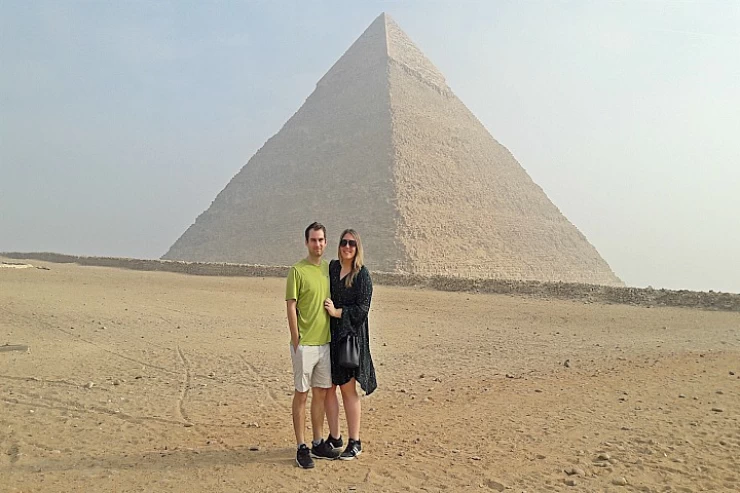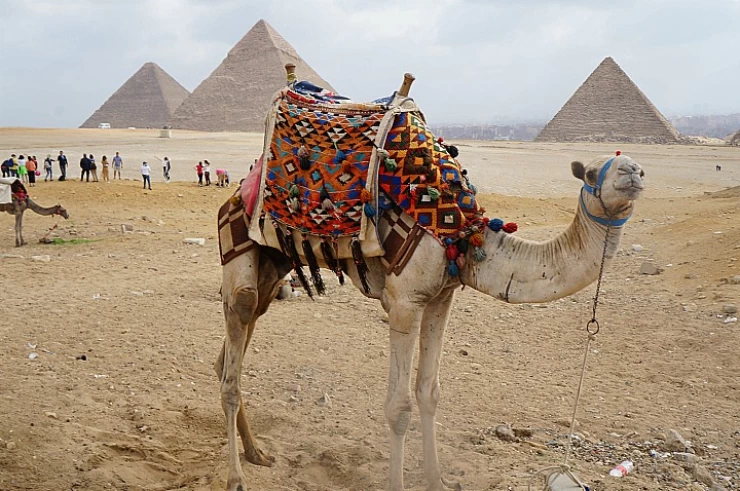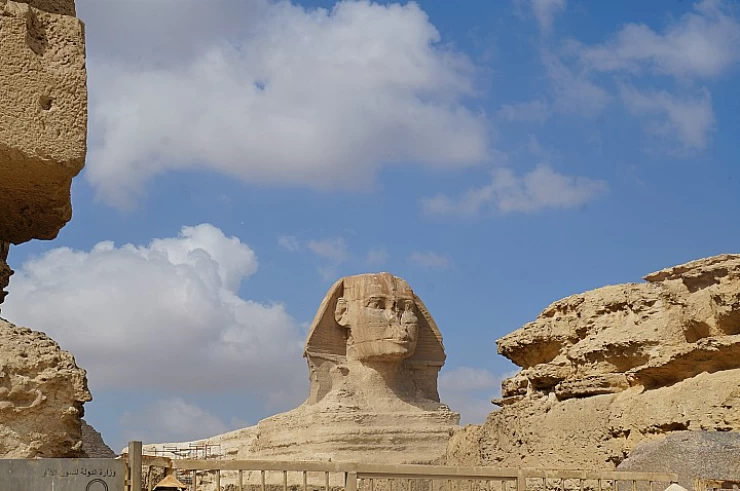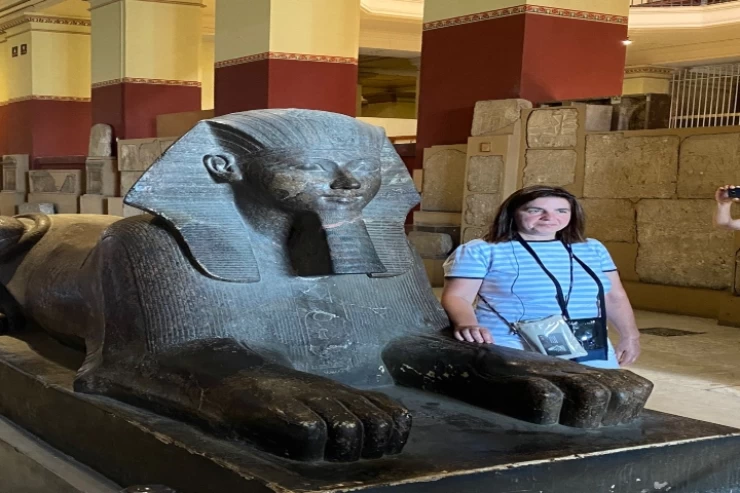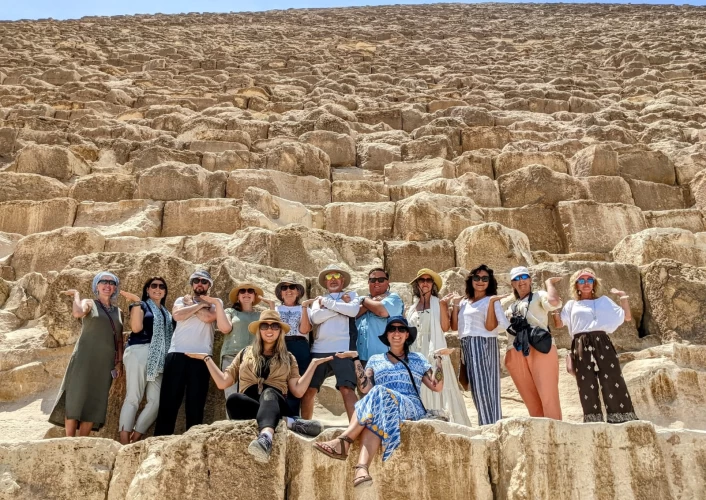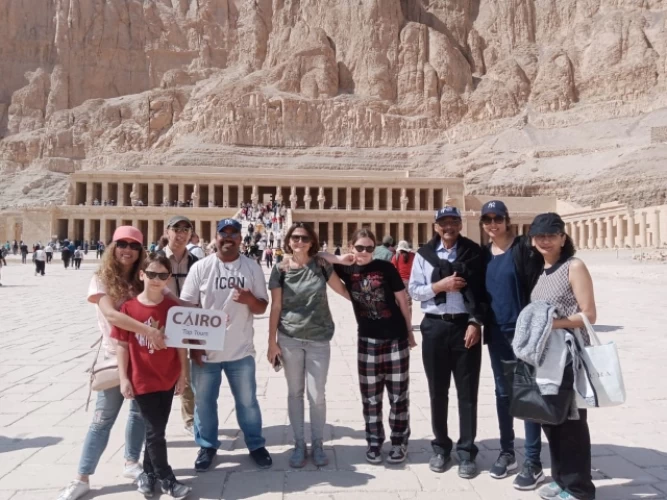Amr Ibn El Aass
Amr ibn al-Aas (w. H. 573 - d. January 6, 664), was a Muslim Arab military leader who was famous for leading the Islamic armies to conquer Egypt in the year 640. He was a contemporary of the Prophet Muhammad, and he was one of his companions, after his conversion to Islam in the year 8 AH. He founded Fustat and made it the capital of Egypt, and built the Amr Ibn Al-Aas Mosque, which is considered the first mosque in Africa. Amr bin Al-Aas was a shrewd Arab, a man of opinion and thought, and a knight from the knights.
Amr Ibn El Aass in Egypt
The Quraysh sent him to Abyssinia to ask the Negus to hand him over to the Muslims who immigrated to Abyssinia fleeing from the infidels and to return them to Mecca to hold them accountable and repel them for their new religion, but the Negus did not respond to him and his response disappointed.
Ibn El Aas's early life
Amr grew up in a luxurious house, and he was eloquent, strong-minded, steadfast in gins, strong-built, skilled in sword fighting, and with knightly strikes. He traded with her and her conditions, and that qualified him to be the Messenger of Quraysh with Abdullah bin Abi Rabi’a to the Negus, the king of Abyssinia, to ask him to expel the Muslims who had immigrated to his country fleeing their religion, and to return them to Mecca. With Amr and his companion, Amr tried to convince the Negus to take them out of his country again, but he refused and ordered them to return to them the gifts that the Quraish brought to him and his card. This mission had an effect on himself, as he touched the Muslims of faith in their faith and love for one another.
In Egypt, a city called Alexandria, so Amr said to him: I do not know it and I have never entered it. The deacon said to him: If you entered it, you would know that you have never entered something like it. To him the deacon: Yes to you, by God, I have the covenant and the covenant to fulfill you and return you to your companions. Amr said to him: How much will I stay in that?
He said: A month you go with me to go with us for ten, and you stay with us for ten, and for you, I have to keep you going and that I send someone to keep you back, so Amr said to him:
Look at me until I consult my friends about it, so Amr went to his companions, and told them what the deacon had promised and said to them: You will evaluate me until I return to you, and I have the obligation to give you a portion of that, provided that a man of you will accompany me. So they said: Yes, they sent one of them with him, so Amr and his companion set out with the deacon until they ended up in Egypt. Amr saw its architecture, the large number of its people, the wealth and goodness in it, and what he liked.
From money, architecture, the quality of its construction, and the abundance of its people, he increased astonishingly. And they have a ball of gold that is worthy of their kings as they receive it with their sleeves, and while they tested from that ball according to what it was described by that part of them that it was the one who fell the ball in his sleeve and settled. When Amr of Alexandria presented him, the deacon honored him with all the honor, and he clothed him with a brocade dress, and Amr and the deacon sat with the people in that council Where they met the ball while receiving it with their sleeves, and a man threw it with it, and it began to fall until it fell into how much Amr, so they were amazed at that and said: This ball has never lied to us except this time I see this Bedouin owns us.
This is what can never be, and that the deacon walked through the people of Alexandria and informed them that Umar had lived him twice and that he had guaranteed him one dinar and asked them to collect that for him among themselves, so they did and paid it to Amr,
so Amr and his companion set out and the deacon sent with them a guide and a messenger and provided them and honored them until he and his friend returned to their companions Thus, Amr knew the entrance and exit to Egypt and saw what he knew was that it was the best country and the most wealthy. When Amr returned to his companions, he paid them a thousand dinars among them and held a thousand for himself. Amr said: It was the first money I believed and was differentiated.
He said: One hundred camels, and the deacon said to him: We are not camel owners, but we are owners of dinars. He said: It will be a thousand dinars. So the deacon said to him: I am a stranger in this country. I made this a vow for myself, and I made it happen, and I wanted to return to my country, so can you follow me to my country, and you have the covenant and covenant of God to give you two debt because God Almighty has given me life twice, so Amr told him: Where is your country?
Entry of Islam
Amr bin Al-Aas returned to Mecca to reach the Quraysh, the Negus refused to respond to her request to expel Muslims from his country, then he began to follow the news of Muslims in Makkah and Madinah, then he went to the Prophet Muhammad to greet him on his hand, and he was accompanied by Khalid bin Al-Walid and Othman bin Talha, in the eighth year of migration.
And the Prophet, may God’s prayers and peace be upon him, said about him: “The people became the safest and Amru ibn al-Aas believed.” The Prophet appreciated the intelligence, talents, and good opinion of Amr, so he made a contract for him on a company known as a company with the chains [1] consisting of three hundred men, and he sent him to subjugate an otter, and the relatives of his father’s mother because
she was from the tribe of Bili and to invite them to Islam, then the Messenger R provided him with two hundred Among the Muhajireen and Ansar, including Abu Bakr Al-Siddiq and Umar bin Al-Khattab, may God be pleased with them, and Abu Ubaidah bin Al-Jarrah ordered them. Lest that led to the weakening and division of Muslims, and this campaign was known by the same chains because it took place at water known by that name.
Amr returned to Medina after achieving the goal for which he was sent, and the Messenger had previously sent him also among a hundred Muslims to the Hatil tribe to demolish its idol called Sawaa, and then he charged him to go to Oman to invite my two sons of Jollandi (Jafer and Ubad) two rulers of Oman to Islam, and he persuaded Amr, the youngest of the two brothers,
embraced Islam and used it to convince his older brother. When the Messenger knew the success of his mission, he assigned him to collect Oman’s charity, so he remained in his work for about two years, then returned to Medina when the Messenger died.
The Islamic conquest of the Levant
Caliph Abu Bakr Al-Siddiq held four brigades for four commanders to liberate the Levant from the authority of the Romans, one of whom was Amr bin Al-Aas and his face for the liberation of Palestine, and the Rumi governor and the military commander on it were called Aeration; The Arabs called him Ertboun, and he was one of the leaders known for their boldness and competence, and he took from the soldiers as a center for his leadership and mobilized many units of soldiers in Jerusalem, Ramleh and Gaza.
Amr bin Al-Aas was afraid of these large crowds, so he wrote to Caliph Omar at that time to consult him about what he was doing, and the Caliph replied, "We have thrown the best of the Romans with the coolest of the Arabs," aiming from behind that to raise his spirits and encourage him. The battle began between the two sides, and the Muslim forces were not equivalent to the Byzantine forces, however, Amr and his army were able to defeat the Romans.
Amr participated in the Battle of Yarmouk, he was on the sidelines of the Arab Muslim Army, and he showed courage and courage during the fighting, which increased his fame and the soldiers' respect for their capabilities. And when the Muslim armies headed to liberate Damascus, Amr ibn al-Aas went to Bab al-Faradis, while Khalid bin al-Walid went to the eastern gate and Abu Ubaidah ibn al-Jarrah at Bab al-Jabiya. (2)
Wars of apostasy
The Messenger and Amr died in Oman, so he came until he ended up in Bahrain and found al-Mundhir bin Sawa in death, then he went out to the country of Bani Amer, and he went down to Qarah bin Hubaira while he was offering a man to apostasy and delaying another with an army from Bani Amer, so he honored the place of his resting place.
It contains Qurrah and said: Oh this, the Arabs do not please you with royalty, so if you exempt it from taking its money, then it listens to you and obeys, and if you refuse, do not meet with you.
Amr said: Are you atoning, Korra? Are you afraid of the Arabs ?! By God, the horses have been entrusted to you in the stash of your mother. He passed by Musaylimah the liar and gave him safety, so Amr told him: "Show me what you say." Musaylimah mentioned some of his words, so Amr said: “By God, you know that you are one of the liars.” So Musaylimah promised him. [3]
And when Amr arrived in Medina and Abu Bakr held eleven brigades for the war of the people of apostasy, he convened for Amr and sent him to Qaeda, and he had fought them during the life of the Prophet in the Battle of Dhat al-Silsil, and Qadah had reverted after the Prophet’s death. With his army on the path that he took before until he reached the land of an otter, so he worked the sword in their necks and defeated them on their command, so they returned to Islam, and he returned to Medina carrying the banner of victory.
The Islamic conquest of Egypt
Caliph Omar bin Al-Khattab, while he was in the Levant, held a meeting in Jabiyah, attended by senior pimps to discuss the conditions of the liberated countries in the year 18 AH / 639 CE. His soldiers to carry out the task, and he persuaded the Caliph of this, arguing that the presence of the Romans in Egypt always threatens the Muslims, especially in Palestine, and informed him of the good things that Egypt contains; As he knew it when he was working in commerce in the pre-Islamic era, as he visited it several times and knew most of its regions and cities.
The Caliph descended at Amr's wish and placed 4000 soldiers under his command and told him:
“I am sending you a message. If you arrived before entering its borders, you must leave with your soldiers, and if you received it after entering its borders, go to your destination and seek the help of God and seek his help.”
It seems that Amr delayed receiving the book of the Caliph until he reached the outskirts of Al-Arish, worked according to it, and continued his journey, liberating the city without much trouble in 18 AH / 639AD, and began to penetrate the Egyptian lands until he reached the city of Al-Farma, and its name was Pelusium, so he besieged it for about a month and opened it in a year. Hegira 19 / AD 640, then moved from there to the city of Belbeis, which fell to Amr after two months of fighting.
Amr went after that to Umm Dennin, whose name was Tendonia, where the fighting broke out between him and the Romans who rushed to fortify them in Babylon. Ibn Mukhlid, and the worship of Ibn al-Samit, all of whom are known for their courage and courage, but the periods were delayed, so Amr stopped the fighting and marched with some of his armies towards the Fayoum region to subjugate him as he decided to conquer Umm Dining. Hercules and under his command about 20 thousand fighters and the fighting between the two armies continued, and Amr was able to his opponent thanks to the war plan that he devised, based on surprising the enemy, by placing ambushes that entered the battle at the right time and settled it.
Nothing was left in front of Amr except the fortress of Babylon and Alexandria, so the siege struck the fortress of Babylon for about seven months, making Heliopolis (Ain Shams) a center for his leadership.
The siege was prolonged and the conditions of the besieged Romans worsened and they despaired of the arrival of Madaad for them, so al-Muqawqis (Qiris) asked Amr to send a delegation to negotiate with him. Then he was stripped of his position and banished.
Defeats followed the divisions of the Roman army, so the emperor summoned al-Muqawq from his exile and allowed him to negotiate again with Amr, and conclude peace, especially after Alexandria fell into the hands of the Muslims in 21 AH / 642 CE, and the negotiations resulted in the Romans pledging to pay the tribute and that their armies would not return to Egypt again Or try to recover it.
The Romans did not fulfill their pledge, so they encouraged their agents in Alexandria, then they sent a fleet of 300 ships to help them, so they revolted, so Amr eliminated them, took control of Alexandria, demolished its walls, and seized their boats.
Amr's description of Egypt
Amr Ibn Al-Aas described the man who lived in the deserts of Arabia and its wilderness in the land of Egypt. He said:
«The land of Egypt is visible to its inhabitants in four khula per year.: When irrigated with the water of the Nile, the first one becomes a white cola. It appears as a black amber if the Nile's water is exposed to its soil, and if its land is planted as a green emerald, then various colors appear in it that cater to the beholder and clarify the mind.
Then, when the harvest is planted, it appears as a plate of gold, which is palm trees with colors, grapes, and grapes, and the branches of bitter orange bearing gold Acams and varieties of the marvelous marvels, and it has parks, farms, fisheries, seas, and monsters.
The sea of its current river which rises in the heat of the season when the rivers dry up, God Almighty willing, descends when the land is needed and stands at one boundary.
It does not descend until the end of the landing but is in progress in order for the ships to go through it in the sea, tribally, east, and west. He does not know where he came from and where he is going. Glory to God Almighty Who preferred the region of Egypt over the rest of the regions. ''
The return to Mecca
Amr bin Al-Aas returned to Mecca after his dismissal, and was not in agreement with Caliph Uthman, despite his advice to him to follow in the course of state matters the approach of his predecessors Omar and Abu Bakr.
His death
When he was attended by death and the disease of death, his son Abdullah entered him and found him crying, so he said to him: Oh, father! As for the Messenger of God's blessing, may God bless him and give him peace,? So He kissed his face and said, 'I was on three plates (three states), you saw me, and no one hated the Messenger of God, may God bless him, and give him peace, more than I did, and I don't like that I had his power and killed him, and I would be among the people of Hell if I died in that state. When God made Islam in my heart,
I came to the Prophet, may God bless him and grant him peace, and said: Simplify your oath, let me pledge allegiance to you, so he extended his oath, and he said, I grabbed my hand, and he said: "What do you have, Amr?" He said: I said: I wanted to stipulate. He said: "What do you require?" I said: To be forgiven, he said: “Did you not know that Islam destroys what was before it? And that migration destroys what was before it? And that Hajj erases what was before it?” And no one was dearer to than the Messenger of God, may God’s prayers and peace be upon him, and there is no time in My eyes are from him, and I could not fill my eyes with him in reverence for him, and if I were asked to describe him I would not stand up.
Because I did not fill my eyes with it in reverence for him, and if I died in that state, I would hope to be one of the people of Paradise. Then we have things that I do not know what I am in, so if I die, do not mourn or fire accompany me, and if you bury me, then they wage fire on dust, then set up around my grave as much as the slaughter of a camel (the time during which a camel is slaughtered), and its flesh is divided.
So that I can take comfort with you, and see what I review the messengers of my Lord with.
Amr bin Al-Aas was buried at the foot of the Mokattam Mountain, and his last words were:
"Oh God, you commanded me, so I did not obey and rebuked me, so I did not rebuke, nor innocent, so I apologize, nor arrogant, but ask forgiveness. There is no god but you."
Latest Articles
Admin
Seabourn Sojourn Cruise Stops in Safaga Port
The Seabourn Sojourn, the flagship vessel of Seabourn Cruise Line's ultra-luxury fleet, was built in 2008 at the T. Mariotti shipyard in Genoa, Italy. Measuring 198 metres, it can accommodate up to 450 guests in its 225 spacious all-suite staterooms.
Admin
Norwegian Sky Cruise Stops in Safaga Port
Norwegian Cruise Line operates a cruise ship called the Norwegian Sky. It was constructed in 1999 and can accommodate 2,004 passengers in addition to 878 crew members. The ship has several dining establishments, lounges and bars, a spa and fitness center, swimming pools, and a number of entertainment areas.
Admin
Explora II Cruise Stops in Safaga Port
Explora II, the second vessel in the Explora Journeys fleet, sets sail in 2024 to redefine luxury cruising. With 461 ocean-front suites, 9 culinary experiences, and 4 pools, this haven of sophistication and sustainability promises an unforgettable "Ocean State of Mind" journey to inspiring destinations.
Admin
Mein Schiff 6 Cruise Stops in Safaga Port
The Mein Schiff 6 is the latest cruise ship in the renowned TUI Cruises fleet, offering passengers a luxurious and sophisticated cruise experience. At 315 metres long, this floating resort features a range of dining options, entertainment, and recreational facilities, including a spa, fitness centre, and sports amenities.
Admin
Mein Schiff 4 Cruise Stops in Safaga Port
When the Mein Schiff 4 cruise ship docks in Safaga, Egypt, passengers are granted access to a realm of ancient wonders. Aboard this state-of-the-art vessel, guests can embark on meticulously curated shore excursions that showcase the region's most iconic landmarks, including the Giza Pyramids, the enigmatic Sphinx, and the remarkable tombs and temples of the Valley of the Kings in Luxor.
Admin
MS Europa Cruise Stops in Safaga Port
The Silver Moon, Silversea's latest flagship, is a luxury cruise ship that offers an exceptional travel experience for Venezuelans exploring Egypt. With a capacity of 596 guests and an impressive 40,700 gross tonnes, the Silver Moon maintains the small-ship intimacy and spacious all-suite accommodations that are the hallmarks of the Silversea brand.






